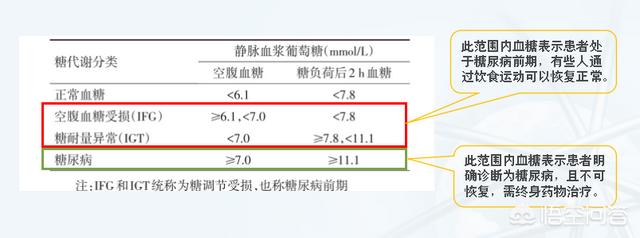What causes diabetes? Can high blood sugar cause diabetes?
Diabetes mellitus is due to a number of causes of pancreatic islet dysfunction, resulting in insufficient insulin secretion, which in turn causes an increase in blood glucose.
Common causes of pancreatic islet dysfunction are:
1, obesity, obese people in the body will be more insulin resistance, so that the body's insulin sensitivity is reduced, so that the pancreas is forced to secrete more insulin to reduce blood glucose, over time, it is easy to lead to permanent damage to the pancreatic islet function, which leads to diabetes.
Excessive dietary energy intake and insufficient exercise are the causes of obesity, so usual gorging, overeating, favoring high energy, and being sedentary are all triggers for diabetes.
2, excessive pressure, we should not ignore the impact of mental factors more blood sugar, I have contacted some of the sugar friends, some people are due to long-term mental stress leading to diabetes, stress will lead to sympathetic nerve excitation, which will make the blood sugar rise. Of course, there are also excessive mood swings, tension, depression and other bad moods are also easy to make blood glucose rise.
Some sugar users do not understand the relationship between high blood sugar and diabetes. If high blood sugar occurs and meets the diagnostic criteria for diabetes, it is diagnosed as diabetes; if it does not meet the diagnostic criteria for diabetes, then it is pre-diabetes, and there is a high chance that it will develop into diabetes in the future.
Diabetes mellitus is a cluster of metabolic diseases characterized by chronic hyperglycemia.
Diabetes is multifactorial, and the exact causes are not yet fully understood; some are clearly known and others are still in the unknown stage.
There are two main types of diabetes, type 1 diabetes and type 2 diabetes. In addition to these two, there is also diabetes secondary to acute pancreatitis or chronic pancreatitis, or surgery (pancreatectomy).
The main mechanism of type 1 diabetes is insulin deficiency, and the main mechanism of type 2 diabetes is insulin resistance (deterioration of insulin action).
Type 1 diabetes is now thought to be related to the immune destruction of insulin-secreting cells in the body's pancreas, both due to its own genetic traits and acquired environmental factors such as infections.
Type 2 diabetes is also caused by a combination of genetic traits and environmental factors, which include a variety of factors such as diet and exercise.
However, regardless of the type of diabetes, high blood sugar is a characteristic of it, so the presence of high blood sugar means that it is diabetes, and it is not a matter of causing it or not!
The causes of diabetes mellitus are complex and vary from person to person, and the onset of diabetes mellitus is greatly influenced by genetic and environmental factors. According to current research, the causes of diabetes can be broadly categorized as follows.
1. Genetic factors
Diabetes has a racial and familial predisposition. However, it is not the diabetes itself that is inherited by the patient, but the susceptibility to diabetes, for example, if the parents have diabetes, the children will be relatively prone to diabetes, but it is not absolutely certain that they will develop diabetes. Diabetes can only be triggered by a combination of external habits, the environment and family genetics, for example, if parents have diabetes and their children are obese and overeat, they will be more prone to the disease.
2. Viral infections and drug toxicity
For individuals susceptible to diabetes, viruses such as rubella virus, cytomegalovirus, mumps virus, adenovirus, and cerebral and cardioviruses can damage pancreatic β-cells, leading to a lack of insulin secretion, which can lead to diabetes. Rodenticides, tobacco acid, glucocorticoids, thyroid hormones, thiazides, phenytoin sodium, diazepam, etc. can damage pancreatic β-cells, inhibit insulin synthesis and secretion, and induce glucose tolerance abnormality or diabetes mellitus.
3. Unhealthy lifestyles and obesity
Unhealthy lifestyle and obesity are important triggering factors for diabetes. With the improvement of daily living conditions, some patients have been on a diet high in calories (more oil, more sugar) and salt for a long time. Due to the patient's dietary intemperance, and lack of exercise, often lead to over-nutrition, aggravate the burden of pancreatic β-cells, and over time triggered diabetes mellitus. Obese people are prone to diabetes is mainly due to obese people insulin regulation of peripheral tissues of glucose oxidation, utilization of obstacles, which leads to increased blood glucose.
4. Self-illness
Patients who themselves suffer from acromegaly, Cushing's syndrome, pancreatic hyperglycemia, pheochromocytoma, and inflammation, trauma, and tumors in the pancreatic area are also prone to diabetes.
Hyperglycemia is a specific form of diabetes, and whether it can ultimately lead to diabetes depends on the patient's specific blood glucose numbers.

[1] CHEN Xiaoli, JI Renjun. Etiology and pathogenesis of diabetes mellitus[J]. China Modern Drug Application, 2008, 2(24):189-190.
[2] WU Ke, WANG Zhanjian. Etiology, clinical manifestations and treatment of diabetes mellitus[J]. China Medical Guide, 2012, 10(16):75-76.
Drugs.com authoritative interpretation, unauthorized reproduction, plagiarism will be prosecuted
This question and answer are from the site users, does not represent the position of the site, such as infringement, please contact the administrator to delete.